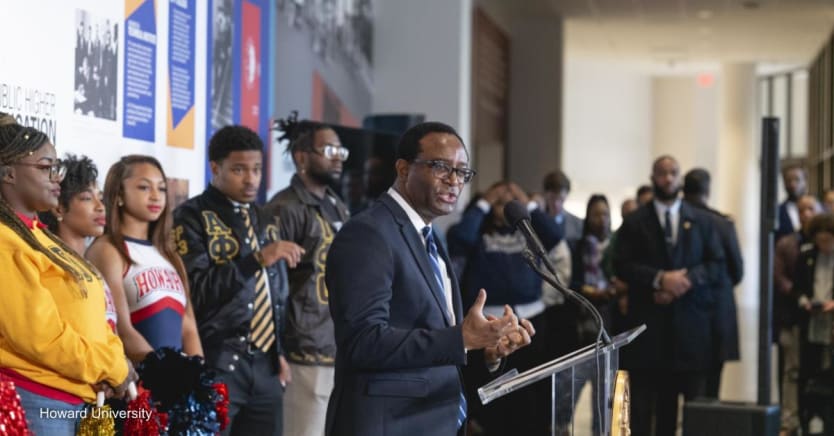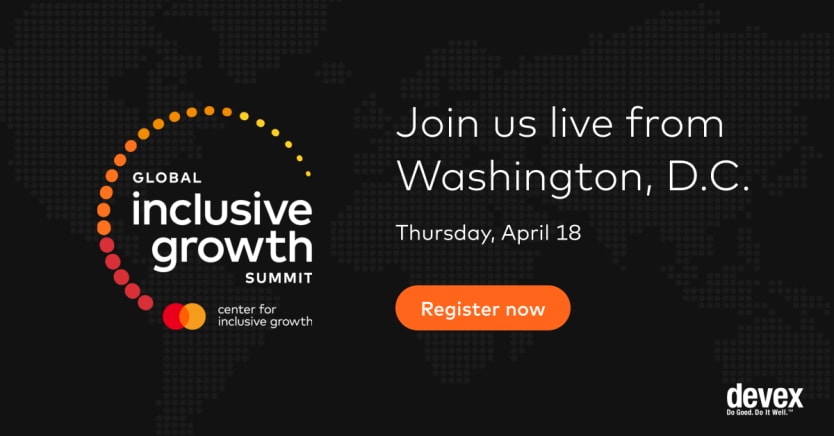AI at the intersection of equity, education, and workforce development

As artificial intelligence technology becomes ever-present across all sectors, academic institutions must adapt to ensure their students are entering the world equipped to use AI tools in a way that contributes toward social good, said Dr. Ben Vinson III, president of Howard University, a historically Black research university based in Washington, D.C.
Educational institutions are best placed to theorize, experiment, and explore the social implications of such technology, Vinson explained. “We can help determine when, and in what spaces, AI is best employed. We can help understand when AI needs to encompass a broader cultural frame or when it needs to be deployed with deeper cultural sensitivity, to encourage a keener sense of appreciating differences,” he said.
As it stands, AI is already being used to detect disease, deliver more targeted disaster response, build predictive mechanisms to determine changing forest cover, and streamline NGO operations. Yet at the same time, algorithm flaws mean it can exhibit biases that can impact aid delivery, exacerbate inequalities, and put people’s data and privacy at risk.
Dr. Ben Vinson III is a featured speaker at the 2024 Global Inclusive Growth Summit on April 18, hosted by the Mastercard Center for Inclusive Growth and its media partner Devex. Register for the livestream to hear more from purpose-driven leaders on inclusive growth.
Ensuring the next generation of workers understands the nuances of AI technology will be critical in “assisting humanity to inspire greater achievements,” Vinson said.
Sitting down with Devex, he explained why there is a responsibility on educational institutions to address AI, the active approach Howard University is taking to best equip students for the changing technology landscape, and the partnerships that are key to turning rhetoric into reality.
This conversation has been edited for length and clarity.
How do you see AI shaping the future of education?
As institutions of higher education, we have a deep responsibility when it comes to emergent technologies like AI.
We need to educate our students in a variety of fields to be conversant in the technology and be ready to use it in the workforce. However, we also need to help them be builders of the technology, since today’s students will be at the vanguard of making further advancements as tomorrow’s coders, systems designers, and software engineers.
It is also incumbent upon us to define and probe the ethics of the technology. Universities and other educational settings are unique places where the philosophical, social, humanistic, and societal implications of technology can be theorized and applied, enabling us to test and find ways to build social systems that incorporate responsible AI. As a historically Black university in particular — given our mission and our constituency — we are a bastion in American society that can address the biases, inequities, and deep social implications of technology in ways that can pave the way for the type of future we all seek.
What to expect at the 2024 Global Inclusive Growth Summit
In this video interview, Devex's Raj Kumar and Mastercard's Shamina Singh share what they're looking forward to from this year's summit — and reveal an exciting speaker announcement.
Lastly, we must be experimenters with the technology. At Howard University, we embrace digital transformation strategies in a way that can help improve efficiencies and upskill our workforce. But balance it with how technology can help us learn, expand our creativity, and enhance the quality of human existence.
How do you see AI being harnessed as a force for good, specifically when it comes to DEI [diversity, equity, and inclusion], addressing systemic inequalities, and promoting racial and social justice?
As AI increasingly becomes fueled by the power of quantum computing, the pace of AI’s ability to predict, learn, and know humanity will expand exponentially. With that comes the risk that the technology will be able to even more rapidly incorporate the biases that have plagued and constrained humanity, harming our own interrelations. This poses greater risk as AI becomes employed in new platforms such as neural interfacing, implants, and even wearable technology.
Now is the time to be more intentional about policy creation and protections. We must use our own ethically driven, human predictive power to guard against potential misuse, unintended application, and intentional harm from AI as the technology matures.
In 2022, Howard University launched the Center for Applied Data Science and Analytics, or CADSA, with support from Mastercard's Center for Inclusive Growth. What is CADSA and how is it training students to tackle data equity issues in AI?
CADSA is an interdisciplinary hub, with a focus on building a new graduate program and conducting research that will inform policy and practices related to several areas including, but not limited to, economic empowerment, health disparities, and environmental and social justice, through the lens of data science.
Since CADSA’s founding, we have conducted a cluster hire process that has identified and recruited six new faculty with expertise in data science and data analytics. We have also initiated a new master’s degree in applied data science and analytics. The inaugural cohort of 30 students started the program at the end of 2023.
In addition to learning the technical foundations of data science, the program focuses also on the application of these techniques in the context of social justice and interdisciplinary collaboration. CADSA faculty are also participating in a cybersecurity initiative addressing fraud and other concerns.
This partnership with Mastercard helps advance Howard’s leadership as a major hub of data science for social impact research and training for the next generation of data scientists with expertise in incorporating analysis of racial bias in financial services.
How important are partnerships between academia, private sector actors, and governments when it comes to the responsible advancement of AI technologies?
The age of AI should be an age of deeper partnerships. Humanity is at its best when we are in league with one another. We have solved harder and greater problems when we pool our collective brain power, manpower, and resources.
Of course, the question becomes: What do these sorely needed partnerships look like when the incentive structures for creating them may not align? The goals of a business, for instance, may be out of sync with those of a church or school. To achieve these, we need to expand what our common ground looks like and what a win-win looks like across institutions. We need to stretch our goals and remember that ultimately, the common good is everyone’s responsibility and a shared grand target.
Our partnership with Mastercard is a demonstration of how this can look in action — when we come together, we can be greater than the sum of our parts.
You’ll be speaking at the 2024 Global Inclusive Growth Summit on April 18, shining a spotlight on the issue of AI at the intersection of equity, education, and workforce development. What can livestream viewers expect?
I am excited to participate in this year’s Global Inclusive Growth Summit. I believe the event will be a continuation of many thought-provoking conversations on how we can come together to forge an unprecedented path forward on the equitable integration of AI in our current and future world. The individuals and organizations at this event will be those that can truly affect change around the world.
Register for the livestream of the 2024 Global Inclusive Growth Summit, taking place on Thursday, April 18.

Search for articles
Most Read
- 1
- 2
- 3
- 4
- 5








